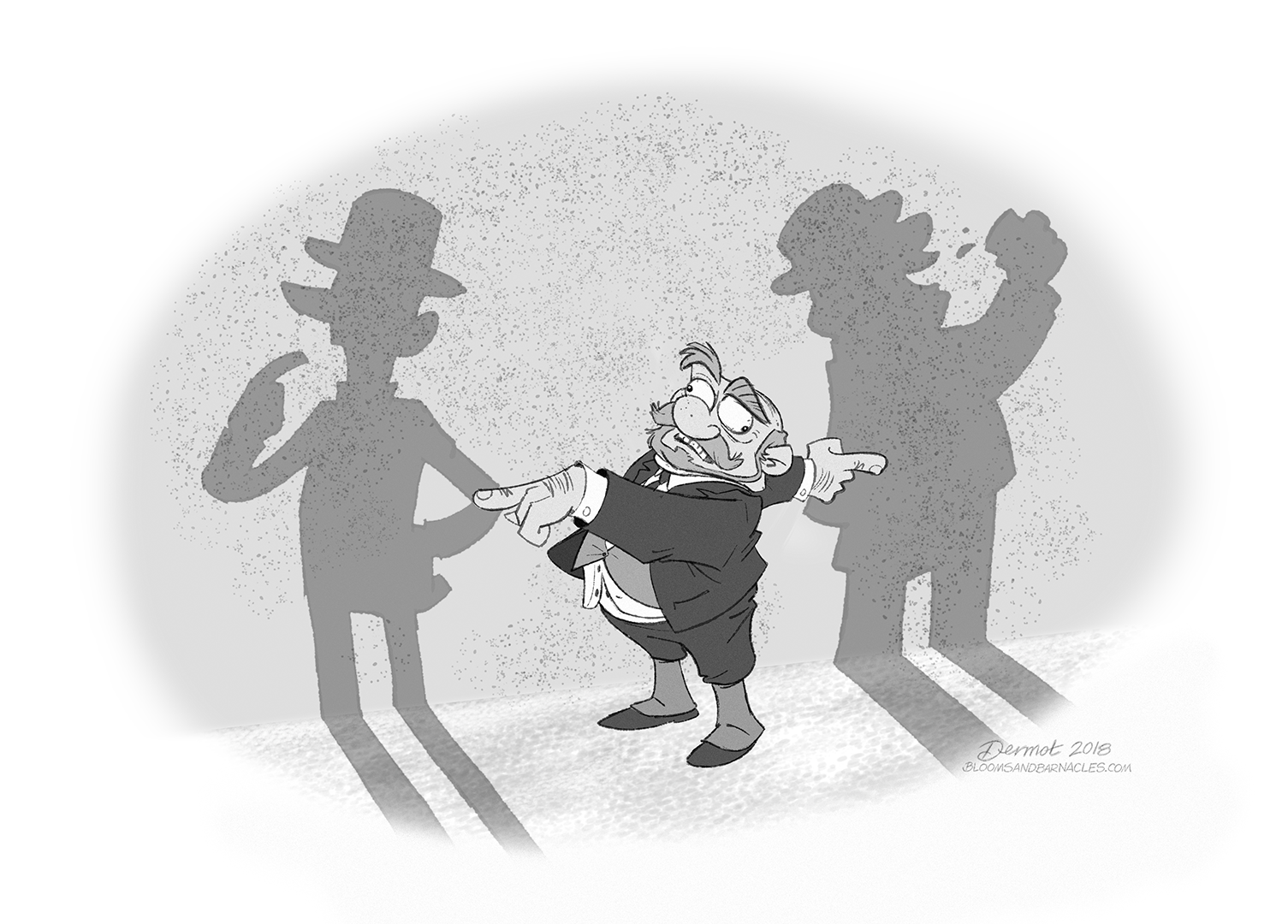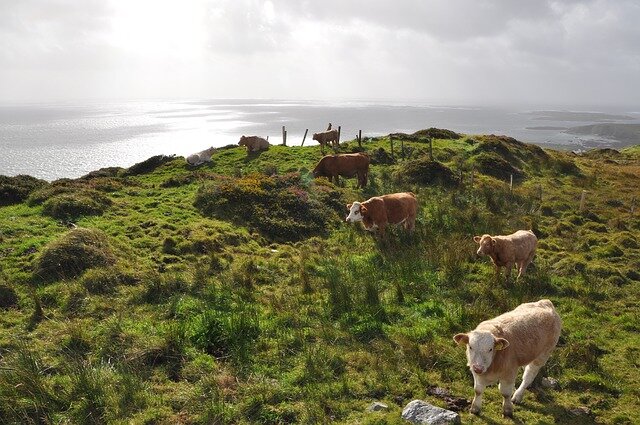Ulysses & The Odyssey: Nestor
The Odyssey, Book 3:
Telemachus and Mentor (Athena in disguise) find themselves in Pylos to meet Nestor, a wise king who fought with Odysseus in Troy. Unfortunately, Nestor doesn’t know what became of Odysseus on his journey home. Athena reveals herself by transforming into an osprey. Nestor is so impressed with Telemachus’ divine companionship that he sacrifices a heifer in Athena’s honor. There is much feasting upon the sacrificial heifer before Telemachus sets off to meet Menelaus, still in search of Odysseus.
Nestor’s biography is fairly exciting. He was the grandson of Poseidon and an Argonaut who fought centaurs and went to war with Odysseus and friends in Troy. When we meet him in The Odyssey, though, his salad days have gone and he is the wise old king of Pylos. His parallel in Ulysses is Mr. Deasy, who oversees his school from a dusty office stuffed with relics from the past, such as his collection of Stuart coins and seashells. Mr. Deasy’s CV is less impressive than Nestor’s (the only thing we know about him is that he is the headmaster of the school where Stephen works), but he is happy to rest on the laurels of his lofty ancestors, particularly Sir John Blackwood who died in an attempt to vote for Ireland to join the United Kingdom. This sort of parallel will arise again and again as we look at Nestor and Deasy. Mr. Deasy believes he is a vaunted wiseman like Nestor, but in truth he is all talk.
For instance, one of Nestor’s defining characteristics is that he is a great horseman. He is known as a knight and a “tamer of horses” and comes from a line of great horse-tamers. Mr. Deasy, on the other hand, has surrounded himself with images of great racehorses owned by members of the aristocracy. Stephen notes:
Framed around the walls images of vanished horses stood in homage, their meek heads poised in air: lord Hastings' Repulse, the duke of Westminster's Shotover, the duke of Beaufort's Ceylon, prix de Paris, 1866.
We do not know if Deasy owns horses or even so much as rides them, but he is certainly an admirer of some fine steeds. These “vanished horses” belong to history, though, champions of a bygone era, as far back as 1866. Eager to look the part of a tamer of horses, Deasy wears gaiters, often worn while on horseback, around his office.
Mr. Deasy's Identity Crisis
The age of both Deasy and Nestor is stressed as well. Nestor is described as “knight Nestor of Gerenia” in the English translation of The Odyssey, but Stuart Gilbert argues that the knightly title probably more accurately translates as “old man.” Homer ties Nestor’s age to his wisdom and integrity. Athena tells Telemachus that Nestor “above all men knows judgement and wisdom.” Deasy’s age has given him a curmudgeonly, pompous demeanor to go with his conservativism, Unionism and anti-semitism. He is eager to mentor the youth in his midst, though this particular youth is less receptive. Stephen sees Deasy as yet another musty relic (“He raised his forefinger and beat the air oldly before his voice spoke”) full of obsolete ideas at odds with Stephen’s own outlook. Deasy is precisely the type of person that Stephen feels oppressed by, not only in a historical sense as Deasy is an enthusiastic Unionist, but by his practicality that prevents him from appreciating Stephen’s artistic temperament. Deasy would rather have Stephen buy himself in coin-sorter than for Stephen to put pen to page. Stephen’s disaffection is a stark contrast to Telemachus’ awe of the wise Nestor.
Though Nestor was aged, he fought in battles well into his twilight years. Mr. Deasy also likes to “break a lance” with youngsters, so to speak, waging his own small wars through letters to the editor and lecturing a disinterested Stephen. He says, “I am a struggler now at the end of my days. But I will fight for the right till the end.” Stephen responds, not in awe, but by shuffling papers and attempting to change the subject. However, he does “inspire” Stephen to deliver his letter to the Evening Standard.
Since they know the ways of world, both Nestor and Deasy warn the young man before them about the wiles of women. Nestor tells Telemachus the story of how Agamemnon was slain by his wife Clytemnestra's seductor following the Trojan War. Clearly a cautionary tale. Deasy also has warnings for Stephen about the devious ways of women by providing several historical and mythological examples of women who betrayed their men, amongst them Menelaus, Agamemnon’s brother whose wife Helen’s infidelity is blamed for the onset of the Trojan War. This reference stands out since it is one of the few times a character in Ulysses mentions a character in The Odyssey. Of course, we later learn in ‘Aeolus’ that Mr. Deasy’s fixation on disloyal women is likely due to his “grass widow” of a wife.
Cows, I win.
One further quality shared by Nestor and Deasy is a fixation on cows and bulls. When Telemachus and Mentor arrive in Pylos, Nestor’s people are sacrificing dozens of bulls to honor Poseidon. Before departing, Nestor offers an additional sacrifice of a heifer in Telemachus’ honor. Mr. Deasy is trying to prevent the death of Irish cattle, on the other hand. He tasks Stephen with delivering a letter to the Evening Standard regarding a cure for foot and mouth disease, currently ravaging the Irish herds. Ireland is needlessly sacrificing its cattle and economy to a curable disease, and Mr. Deasy believes he can be his nation’s savior.
Bullock Castle, 1830
Additionally, Nestor’s castle is located at the mouth of the River Alpheus, which has many mythological associations with cattle. Alpheus was the river diverted by Hercules to clean the Augean Stables and figured in myths about Apollo’s herds - the oxen of the sun later harried by Odysseus’ men. Mr. Deasy’s school is located in Dalkey, Ireland, which is home to Bullock Castle sitting upon Bullock Harbor, quite near to the Sandycove Martello tower. In this case, “bullock” has nothing to do with literal bullocks; it’s an anglicized version of the Irish Cuan Bhlóic, which means a harbor with a tidal blow hole. Stephen laments that when Buck Mulligan finds out he’s helping Deasy with the foot and mouth letter, Mulligan will surely coin a new unwelcome nickname - the bullockbefriending bard. It’s the only instance in which the term “bullock” is used to describe bovine creatures in the episode, tying Stephen not only to Sandycove, but also to The Odyssey.
In the end, both Telemachus and Stephen leave their wise man unenlightened on their journey. For Telemachus, it is just one step on a longer journey, but for Stephen there are deeper implications. John Rickard argues that ‘Nestor’ is, at its foundation, an episode about Joyce’s lack of respect for authority. The mythical wiseman Nestor is transformed into Mr. Deasy, convinced of his own authority while Stephen parries his strokes of so-called wisdom at every turn. Deasy is a parody of true wisdom and authority - a conservative master overseeing a school of well-to-do young boys. Stephen, the Artist, can gain no wisdom here because he is restricted intellectually by the headmaster’s fixation on the past. Mr. Deasy sees himself as a paternal role model for the wayward youth, but Stephen knows he must continue his journey further afield.
Further Reading
Burgess, A. (1968). ReJoyce. New York: W.W. Norton & Co.
Gifford, D., & Seidman, R. J. (1988). Ulysses annotated: Notes for James Joyce's Ulysses. Berkeley: University of California Press.
Gilbert, S. (1955). James Joyce’s Ulysses: a study. New York: Vintage Books.
Homer, translated by Palmer., G.H. (1912). The Odyssey. Mineola, New York: Dover Publications.
Rickard, J. (1997). Stephen Dedalus among schoolchildren: The schoolroom and the riddle of authority in Ulysses. Studies in the Literary Imagination, 30, 17-36. Retrieved from http://www.facstaff.bucknell.edu/rickard/authority.html




